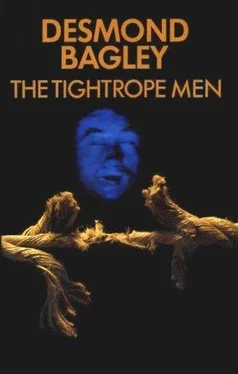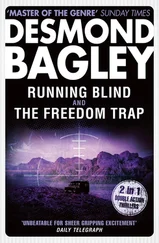Desmond Bagley - The Tightrope Men
Здесь есть возможность читать онлайн «Desmond Bagley - The Tightrope Men» — ознакомительный отрывок электронной книги совершенно бесплатно, а после прочтения отрывка купить полную версию. В некоторых случаях можно слушать аудио, скачать через торрент в формате fb2 и присутствует краткое содержание. Город: London, Год выпуска: 1973, ISBN: 1973, Издательство: HarperCollins, Жанр: Прочие приключения, на английском языке. Описание произведения, (предисловие) а так же отзывы посетителей доступны на портале библиотеки ЛибКат.
- Название:The Tightrope Men
- Автор:
- Издательство:HarperCollins
- Жанр:
- Год:1973
- Город:London
- ISBN:978-0-00-221847-4
- Рейтинг книги:4 / 5. Голосов: 1
-
Избранное:Добавить в избранное
- Отзывы:
-
Ваша оценка:
- 80
- 1
- 2
- 3
- 4
- 5
The Tightrope Men: краткое содержание, описание и аннотация
Предлагаем к чтению аннотацию, описание, краткое содержание или предисловие (зависит от того, что написал сам автор книги «The Tightrope Men»). Если вы не нашли необходимую информацию о книге — напишите в комментариях, мы постараемся отыскать её.
The Tightrope Men — читать онлайн ознакомительный отрывок
Ниже представлен текст книги, разбитый по страницам. Система сохранения места последней прочитанной страницы, позволяет с удобством читать онлайн бесплатно книгу «The Tightrope Men», без необходимости каждый раз заново искать на чём Вы остановились. Поставьте закладку, и сможете в любой момент перейти на страницу, на которой закончили чтение.
Интервал:
Закладка:
‘Don’t make any mistake about that,’ said Carey. ‘I’m saving up for my old age.’
She looked at him contemptuously and stepped back through the window without answering, and the man with the canvas bag followed her. Carey waited in silence for a moment and then walked over and closed the window and shot the bolts. He came back into the middle of the room and began to fill his pipe.
‘You know that Kidder tried to con me into believing he was with the CIA. I always thought that American accent of his was too good to be true. It was idiomatic, all right, but he used too much idiom — no American speaks with a constant stream of American clichés.’ He struck a match. ‘It seems the Russians were with us, after all.’
‘Sometimes you get a bit too sneaky for me,’ said McCready.
‘And me,’ said Lyn. ‘Giles was right — you’re a thoroughgoing bastard.’
Carey puffed his pipe into life. ‘George: our friend, Giles, has had a rough day. Let’s put him to bed.’
Forty
Denison walked across St James’s Park enjoying the bland, late October sunshine. He crossed the road at the Guards Memorial and strolled across Horse Guards Parade and through the Palace arch into Whitehall itself, neatly avoiding a guardsman who clinked a sabre at him. At this time of the year the tourists were thin on the ground and there was not much of a crowd.
He crossed Whitehall and went into the big stone building opposite, wondering for the thousandth time who it was wanted to see him. It could only have to do with what had happened in Scandinavia. He gave his name to the porter and stroked his beard while the porter consulted the appointment book. Not a bad growth in the time, he thought somewhat vaingloriously.
The porter looked up. ‘Yes, Mr Denison; Room 541. I’ll get someone to take you up. Just sign this form, if you please, sir.’
Denison scribbled his signature and followed an acned youth along dusty corridors, into an ancient lift, and along more corridors. ‘This is it,’ said the youth, and opened a door. ‘Mr Denison.’
Denison walked in and the door closed behind him. He looked at the desk but there was no one behind it and then he turned as he saw a movement by the window. ‘I saw you crossing Whitehall,’ said Carey. ‘I only recognized you by your movements. God, how you’ve changed.’
Denison stood immobile. ‘Is it you I’ve come to see?’
‘No,’ said Carey. ‘I’m just here to do the preparatory bit. Don’t just stand there. Come in and sit down. That’s a comfortable chair.’
Denison walked forward and sat in the leather club chair. Carey leaned against the desk. ‘I hope your stay in hospital wasn’t too uncomfortable.’
‘No,’ said Denison shortly. It had been damned uncomfortable but he was not going to give Carey even that much.
‘I know,’ said Carey. ‘You were annoyed and worried. Even more worried than annoyed. You’re worried because I’m still with my department; you would like to lay a complaint, but you don’t know who to complain to. You are frightened that the Official Secrets Act might get in the way and that you’ll find yourself in trouble. At the same time you don’t want me to get away with it — whatever it is you think I’m getting away with.’ He took out his pipe. ‘My guess is that you and Lyn Meyrick have been doing a lot of serious talking during the last fortnight. Am I correct?
Carey could be a frightening man. It was as though he had been reading Denison’s mind. ‘We have been thinking something like that,’ he said unwillingly.
‘Quite understandable. Our problem is to stop you talking. Of course, if you did talk we could crucify you, but by then it would be too late. In some other countries it would be simple — we’d make sure that you never talked again, to anyone, at any time, about anything — but we don’t do things that way here.’ He frowned. ‘At least, not if I can help it. So we have to convince you that talking would be wrong. That’s why Sir William Lyng is coming here to convince you of that.’
Even Denison had heard of Lyng; he was somebody in the Department of Defence. ‘He’ll have his work cut out.’
Carey grinned and glanced at his watch. ‘He’s a bit late so you’d better read this. It’s secret, but not all that much. It represents a line of thought that’s in the air these days.’ He took a folder from the desk and tossed it into Denison’s lap. ‘I’ll be back in a few minutes.’
He left the office and Denison opened the folder. As he read a baffled look came over his face, and the more he read the more bewildered he became. He came to the end of the few pages in the folder and then started to read from the beginning again. It had begun to make a weird kind of sense.
Carey came back half an hour later; with him was a short, dapper man, almost birdlike in the quickness and precision of his movements. ‘Giles Denison — Sir William Lyng.’
Denison got up as Lyng advanced. They shook hands and Lyng said chirpily, ‘So you’re Denison. We have a lot to thank you for, Mr Denison. Please sit down.’ He went behind the desk and cocked his head at Carey. ‘Has he...?’
‘Yes, he’s read his homework,’ said Carey.
Lyng sat down. ‘Well, what do you think of what you’ve just read?’
‘I don’t really know,’ said Denison, shaking his head.
Lyng looked at the ceiling. ‘Well, what would you call it?’
‘An essay on naval strategy, I suppose.’
Lyng smiled. ‘Not an essay. It’s an appreciation of naval strategy from quite a high level in the Department of Defence. It deals with naval policy should the Warsaw Pact and NATO come into conflict in a conventional war. What struck you about it? What was the main problem outlined?’
‘How to tell the difference between one kind of submarine and other. How to differentiate between them so that you can sink one and not the other. The subs you’d want to sink would be those that attack shipping and other submarines.’
Lyng’s voice was sharp. ‘Assuming this country is at war with Russia, what conceivable reason can there be for not wanting to sink certain of their submarines?’
Denison lifted the folder. ‘According to this we wouldn’t want to sink their missile-carrying submarines — the Russian equivalent of the Polaris.’
‘Why not?’ snapped Lyng.
‘Because if we sink too many of them while fighting a conventional war the Russians might find themselves losing their atomic edge. If that happened they might feel tempted to escalate into atomic warfare before they lost it all.’
Lyng looked pleased and glanced at Carey. ‘He’s learned the lesson well.’
‘I told you he’s a bright boy,’ said Carey.
Denison stirred in the chair. He did not like being discussed as though he were absent.
Lyng said, ‘A pretty problem, isn’t it? If we don’t sink their conventional submarines we stand a chance of losing the conventional war. If we sink too many of their missile-carriers the war might escalate to atomic catastrophe. How do you distinguish one submarine from another in the middle of a battle?’ He snapped his fingers. ‘Not our problem — that’s for the scientists and the technologists — but do you accept the validity of the argument?’
‘Well, yes,’ said Denison. ‘I see the point, but I don’t see what it’s got to do with what happened in Finland. I suppose that’s why I’m here.’
‘Yes, that’s why you’re here,’ said Lyng. He pointed to the folder in Denison’s hand. ‘That is just an example of a type of thought. Do you have anything to say, Carey?’
Carey leaned forward. ‘Ever since the atomic bomb was invented the human race has been walking a tightrope. Bertrand Russell once said, “You may reasonably expect a man to walk a tightrope safely for ten minutes; it would be unreasonable to do so without accident for two hundred years.”’ He hunched his shoulders. ‘Well, we’ve walked that tightrope for thirty years. Now, I want you to imagine that tightrope walker; he carries a long balancing pole. What would happen if you suddenly dropped a heavy weight so that it hung on one end of the pole?’
Читать дальшеИнтервал:
Закладка:
Похожие книги на «The Tightrope Men»
Представляем Вашему вниманию похожие книги на «The Tightrope Men» списком для выбора. Мы отобрали схожую по названию и смыслу литературу в надежде предоставить читателям больше вариантов отыскать новые, интересные, ещё непрочитанные произведения.
Обсуждение, отзывы о книге «The Tightrope Men» и просто собственные мнения читателей. Оставьте ваши комментарии, напишите, что Вы думаете о произведении, его смысле или главных героях. Укажите что конкретно понравилось, а что нет, и почему Вы так считаете.












